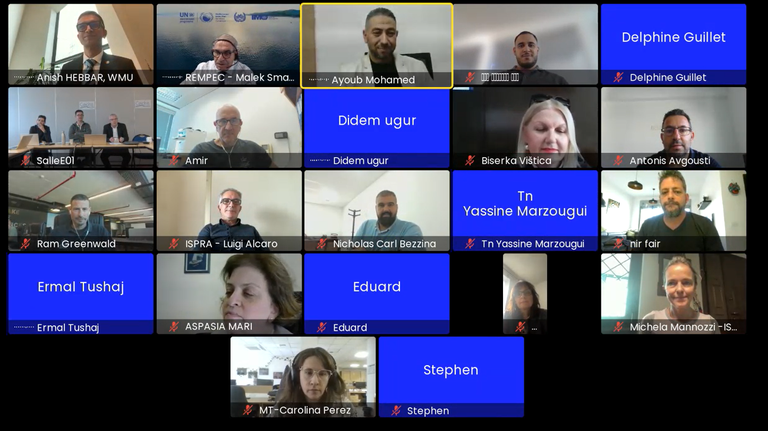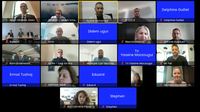Regional Webinar on the Study on Readiness of the Mediterranean Region to Respond to Marine Pollution Incidents Involving Low-Sulphur Fuels and Alternative Fuels, and the Revised Guidelines for the Use of Dispersants for Combating Oil Pollution at Sea in the Mediterranean region – Nov 17, 2025

The Regional Marine Pollution Emergency Response Centre for the Mediterranean Sea (REMPEC) organised a Regional Webinar on the Study on Readiness of the Mediterranean Region to Respond to Marine Pollution Incidents Involving Low-Sulphur Fuels and Alternative Fuels, and the Revised Guidelines for the Use of Dispersants for Combating Oil Pollution at Sea in the Mediterranean region on 17 November 2025.
The Webinar was financed by the UNEP/MAP Mediterranean Trust Fund (MTF). It gathered 20 participants from 15 out of the 22 Contracting Parties to the Barcelona Convention. The target audience for the Webinar were government officials responsible for preparedness and response to marine pollution.
With the objective to enable the Contracting Parties to the Barcelona Convention (CPs) to adapt and enhance their preparedness and regional cooperation to respond to marine pollution, the Webinar focused on the proposed Strategic Roadmap to implement the Specific Objectives of the Study on Readiness of the Mediterranean Region to Respond to Marine Pollution Incidents Involving Low-Sulphur Fuels and Alternative Fuels and the revised Part II Basic Information on Dispersants and their Application (REMPEC 2025) of the Guidelines for the Use of Dispersants for Combating Oil Pollution at Sea in the Mediterranean Region (REMPEC 2011)
The Study was commissioned by REMPEC in line with Decision IG.25/14 of COP 22 (Türkiye, December 2021) on the Designation of the Mediterranean Sea, as an Emission Control Area for Sulphur Oxides (Med SOX ECA), requesting REMPEC to provide technical support to CPs for the implementation of this Decision. The Study was considered by the 16th Meeting of the Focal Points of REMPEC (Malta, May 2025), that agreed on the proposed Strategic Roadmap to implement the Study recommendations on the Short-Medium-Long term, and the Action Plan to operationalise the Strategic Roadmap for the short-term phase.
The Part II ‘Basic Information on Dispersants and their Application’ of the Guidelines, developed by REMPEC and considered by the 16th Meeting of the REMPEC Focal Points, takes into account the developments in the field of dispersants since 2011.
Taking note of the conclusions and recommendations of the 16th Meeting of the Focal Points about both deliverables, the Webinar enhanced the awareness and technical understanding of the competent national authorities and stakeholders, assisting them in the implementation of the above-mentioned Strategic Roadmap, and thus contributing to achieve the Study’s four strategic objectives. The Webinar also highlighted the updates since 2011 on dispersants, response techniques, and ecosystem data for the safe use of dispersants, as well as effective response techniques to marine pollution incidents.
The Webinar concluded with the following set of practical proposals:
- Continue organising thematic webinars to support CPs, stakeholders, and relevant actors in strengthening their knowledge and operational capacity to implement the Study’s Action Plan and achieve its four specific objectives.
- Relaunch the assessment of the level of preparedness for oil spill response, using the online Readiness Evaluation Tool on Oil Spills (RETOS), to identify gaps and areas for improvement.
- Foster the exchange of experiences among Mediterranean research institutions regarding dispersants and the characterization of types of LSF.
- Develop models for thematic tabletop exercises on Low-Sulphur Fuels and on Alternative Fuels (AF), and on Bio-dispersants.
Learn More
Presentations delivered during the Webinar
Read more about Pollution Preparedness and Response


